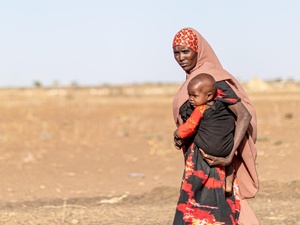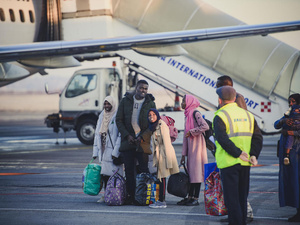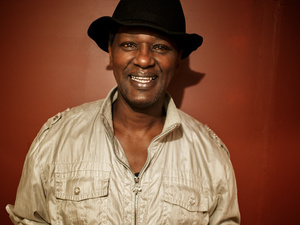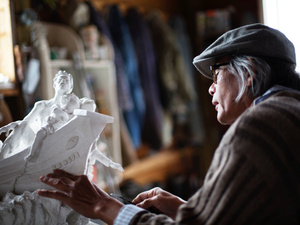Welcome to Japan: first Asian country joins UNHCR's resettlement programme
Welcome to Japan: first Asian country joins UNHCR's resettlement programme

A first group of refugees from Myanmar arriving under Japan's landmark resettlement programme.
TOKYO, Japan, September 28 (UNHCR) - To photographers' flashes and well-wishers' applause, the first 18 refugees ever to be resettled in Japan arrived at Narita airport early Tuesday, putting behind them decades in a jungle camp and beginning new lives in an Asian economic powerhouse.
"I am very happy to have arrived in Japan," one of the refugee women said, looking a bit overwhelmed by the attention of the television crews, before boarding a bus to a reception centre where the group will spend their first week getting acclimatised to Japan's frenetic capital. "Welcome to Japan," read one banner on display at Narita.
The refugee families from Myanmar - three married couples and their 12 children aged one to 15 - stepped off a six-hour overnight flight from Bangkok, the first time any of them had been on an airplane.
Two other families, one with four children and another with three children, had to stay behind in Bangkok at the last minute because they caught a flu that is going around Thailand. They are expected to travel as soon as they get well.
The families, who are farmers of the Karen ethnicity, fled Myanmar between 1985 and 2001. The parents range in age from 28 to 45, and almost all the children were born as refugees in Mae La refugee camp in northern Thailand.
They entered Japan as part of a pilot programme that will see the country take 90 refugees over three years - the first Asian country to become a resettlement country. In the wider Asia-Pacific region, Australia and New Zealand have long been resettlement countries.
"This marks a new chapter in Japan's strengthening of its refugee and asylum policies," said Johan Cels, UNHCR's representative in Japan.
Japan is UNHCR's second-largest donor, and Cels added that "not only does the country provide generous financial support for refugees in many parts of the world, but now also provides a future for refugees in the country. We very much hope Japan will set an example in resettlement for other Asian countries to follow."
The programme has attracted huge media interest in Japan. Both on departure from Bangkok and upon arrival at Narita, the refugees were outnumbered by Japanese journalists.
Nay Min, the oldest refugee man in the group at age 45, said he had been a farmer because that is what the Karen people traditionally do. "But after I arrive in Japan, if they will find me any type of job, I will do it if they can train me," he said in Bangkok before departure.
Admitting to a few sleepless nights for the whole family because of excitement and an excess of happiness, Nay Min said Japan - which he described as "the most developed country in Asia" - represented freedom and a fresh start after almost two decades in a closed camp.
"For 18 years we were struggling," he said. "We got rations from the camp and we had to follow the rules of the camp."
While still in Mae La, the refugees took lessons in adapting to Japanese culture and learned some polite phrases in Japanese. In Tokyo, they will be given apartments, more language lessons and help in adapting to the culture, as well as vocational training and support in finding a job.
Before leaving Mae La, many of the children had their sights set on becoming doctors and teachers, and Nay Min said his highest aspiration for life in Japan was for a good education for his three children, ages seven, 11 and 15.
For himself, assurance that his family's human rights would be respected was paramount. With those rights guaranteed, he admitted with a shy smile that he'd already conceived a grander dream.
"I want to visit countries all over the world once I get a passport from Japan," he said before boarding what he hoped would be only the first flight of many.
By Kitty McKinsey in Bangkok, Thailand and Yuki Moriya in Tokyo, Japan












